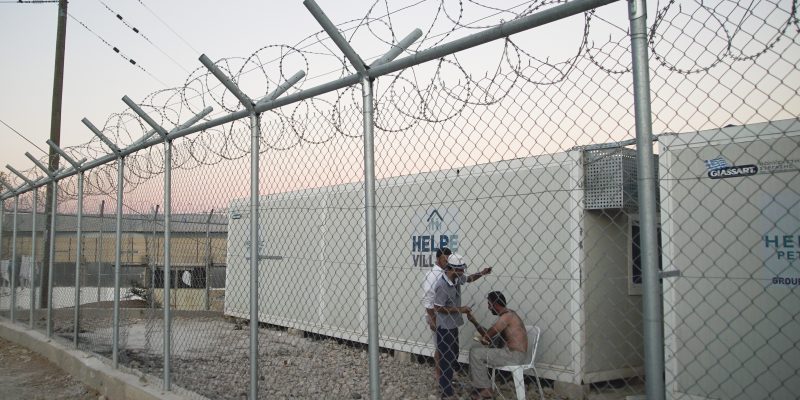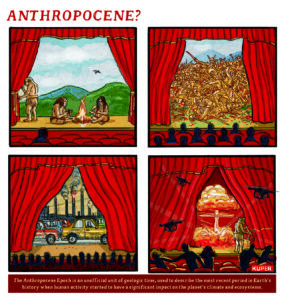Global Warming Drives Climate Refugees to Europe
Immigration, already a highly controversial topic on the continent, is set to grow as many more people fleeing climate change arrive. Refugees in Europe. (Mstyslav Chernov / Wikimedia Commons)
Refugees in Europe. (Mstyslav Chernov / Wikimedia Commons)
The numbers of climate refugees seeking asylum in Europe by the end of the century will be almost three times greater than today unless the world makes radical cuts to its greenhouse gas emissions.
Researchers say migrants applying for asylum in the European Union will by 2100 nearly triple over the average of the last 15 years if carbon emissions continue at their current rate.
They say cutting emissions could slow this human tide, but even then Europe would see asylum seekers rising by at least a quarter.
“Europe is already conflicted about how many refugees to admit,” said the study’s senior author, Wolfram Schlenker, an economist at Columbia University’s School of International and Public Affairs (SIPA) and a professor at the university’s Earth Institute.
“Though poorer countries in hotter regions are most vulnerable to climate change, our findings highlight the extent to which countries are interlinked, and Europe will see increasing numbers of desperate people fleeing their home countries.”
He and the study’s co-author, Anouch Missirian, compared asylum applications to the EU from 103 countries between 2000 and 2014, with temperature variations in the applicants’ home countries.
They found that the more temperatures over each country’s agricultural region deviated from 20°C (68°F) during its growing season, the more likely people were to seek refuge abroad.
The study, published in the journal Science, says crops grow best at an average temperature of 20°C, and so, not surprisingly, hotter than normal temperatures increased asylum applications in hotter places, such as Iraq and Pakistan, and lowered them in colder places such as Serbia and Peru.
Combining the asylum-application data with projections of future warming, the researchers found that an increase of average global temperatures of 1.8°C – a scenario in which carbon emissions flatten globally in the next few decades and then decline, which they call optimistic – would increase asylum applications by 28% by 2100 – 98,000 extra applications to the EU each year.
But if carbon emissions continue on their current trajectory, with global temperatures rising by 2.6°C to 4.8°C by 2100, applications could increase by 188%, leading to an extra 660,000 applications each year.
Under the climate deal struck in 2015, the Paris Agreement, most of the world’s nations agreed to cut carbon emissions by 2100 to 2°C above pre-industrial levels. President Trump’s recent decision to withdraw the US, the world’s second largest carbon emitter, from the accord now jeopardises that goal, which some analysts had already said is unlikely to be reached.
In a further setback to hopes of reducing Americans’ carbon emissions, the US Environmental Protection Agency has proposed lowering the government’s “social cost” of carbon, or the estimated cost of sea-level rise, lower crop yields, and other climate change-related economic damage, from $42 per ton by 2020 to a low of $1 per ton.
Part of the EPA’s argument for the lower figure involves excluding the cost of US emissions to other countries. But the researchers say their study shows how effects in developing countries have clear impacts on developed countries.
Their work adds to a growing body of evidence that weather shocks can destabilise societies, stoke conflict and force people to flee their home countries. Researchers have highlighted the connection between the drying of the Middle East and continuing conflict there, though debate continues over just what part climate change has played.
Solomon Hsiang, professor of public policy at the University of California, Berkeley, who was not involved in the research, called the SIPA study an “incredibly important” wake-up call. “We will need to build new institutions and systems to manage this steady flow of asylum seekers,” he said.
“As we have seen from recent experience in Europe, there are tremendous costs, both for refugees and their hosts, when we are caught flat-footed. We should plan ahead and prepare.”
Your support matters…Independent journalism is under threat and overshadowed by heavily funded mainstream media.
You can help level the playing field. Become a member.
Your tax-deductible contribution keeps us digging beneath the headlines to give you thought-provoking, investigative reporting and analysis that unearths what's really happening- without compromise.
Give today to support our courageous, independent journalists.






You need to be a supporter to comment.
There are currently no responses to this article.
Be the first to respond.